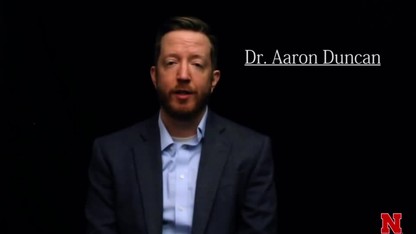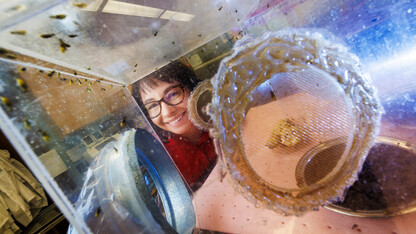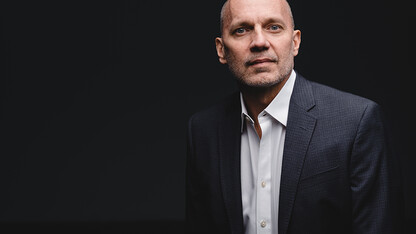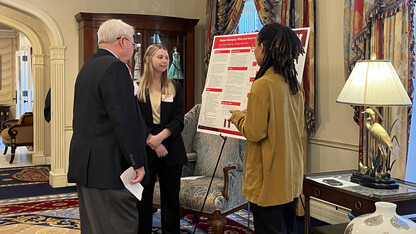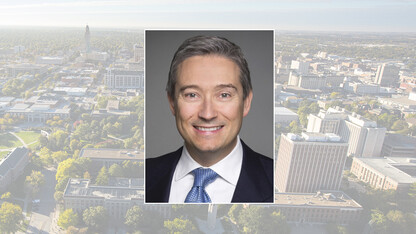· 5 min read
What Aaron Duncan is watching for with Clinton/Trump 2
The second debate between presidential candidates Hillary Clinton and Donald Trump is Oct. 9 in St. Louis. Aaron Duncan, director of the University of Nebraska-Lincoln Speech and Debate Program and an assistant professor of practice in communication studies at Nebraska, looks at how each candidate might improve their performance compared with their first debate on Sept. 26.
How can Donald Trump improve his debate performance?
Ironically, he needs to steal a page from President Obama’s playbook. The man Trump loves to criticize has provided him with blue print for rebounding from a poor first debate outing. After losing the first debate to GOP challenger Mitt Romney in 2012, Obama altered his approach for the second debate. Obama staffers Jon Favreau and Dan Pfeiffer gave the president a list of key issues and statements to bring up during the second debate and as the debate progressed, Obama checked each item off the list in his head. This helped change the direction of the debate. Obama took control by introducing his criticism of Romney early. Trump needs to have a similar mental list of the issues he wants to raise and the attacks he wants to make. He needs to set the tone and he needs to continue to hit on key issues throughout the debate.
What issues should be on Trump’s list?
Trump needs to bring up the issues where Clinton is perceived to be the weakest. Obama, for example, failed to mention in the first debate Romney’s quote that 47 percent of Americans do not pay taxes or take responsibility for their lives. Trump needs to bring up Clinton’s comment describing Trump supporters as a “basket of deplorables.” He also allowed Clinton to escape the first debate without discussion of either the Clinton Foundation or Benghazi. He needs to make fewer assertions without facts and specifics. Trump is vulnerable when he claims America is in terrible shape and losing standing in the world without facts and figures to back him up. Clinton is too smart and well prepared to allow these attacks to get to her.
What else should Trump improve?
He needs to remember that nonverbal communication matters. Political pundits have compared presidential debates to figure skating. It’s not enough just to land the jumps, you also have to do it with style and presentational excellence. For Trump, this means he needs to interrupt less, he needs to avoid sniffing and he needs to keep calm and positive facial expressions when not speaking.
What does Clinton need to do to improve in the second debate?
As the general consensus winner of the first debate, she has less to work on. Her nonverbal communication was good in the first debate, and she was able to get in key attacks on Trump related to his taxes, his comments about women, and about Latinos. She needs to keep the focus on these issues and Trump’s other weaknesses. She got off to slow start in the first debate but she finished strong. She needs to be more offensive earlier in the debate and less defensive. Trump seemed to wear down as the debates went on and become more agitated and defensive. By being aggressive earlier, she can take Trump out of his game plan. His weakness is often not sticking to message and wanting to improvise. His campaign will have a script for him, but whether he follows it will likely depend on Clinton’s strategy earlier in the debate.
How can Clinton be less defensive?
She needs to use more “turns.” This is a powerful debating strategy that we teach in competitive debate. If you can take an opponent’s own argument and “turn it” against them to show why their own words indict them, that is very powerful. Clinton made a mistake when discussing trade agreements in the first debate. Many observers thought Trump won this portion of the debate as he focused on outsourcing and Clinton’s inconsistent stance on the Trans Pacific Partnership. However, Clinton can turn this argument against Trump by pointing out that Trump outsourced many of his own manufacturing jobs. Trump’s own brand of suits and ties are made overseas. The line of argument for Clinton is therefore simple. If Trump cares so much about Americans and their jobs, why is he sending those jobs overseas? This line of argument puts Trump on the defensive and turns the focus away from her.
What will be different for the candidates in the town-hall debates?
One, they must remember regular people, not a moderator, will be asking the questions in this town-hall-style debate. They should not interrupt and speak over their questioners like they might with a professional moderator. They also need to focus on answering questions directly, while showing empathy. Both candidates ought to learn from a previous president, Bill Clinton. Former President Clinton was the master of the town-hall format in which he exuded empathy, compassion and concern for the people in the audience. His town-hall debate victory over George H.W. Bush and Ross Perot helped to propel him to the White House. He made direct eye contact with people asking the questions and he often walked towards them and directed his answer at them specifically. This made his approach feel personable. Neither Hillary Clinton nor Donald Trump tend to come off as personable and empathetic and this is their chance to change that perception of them.
